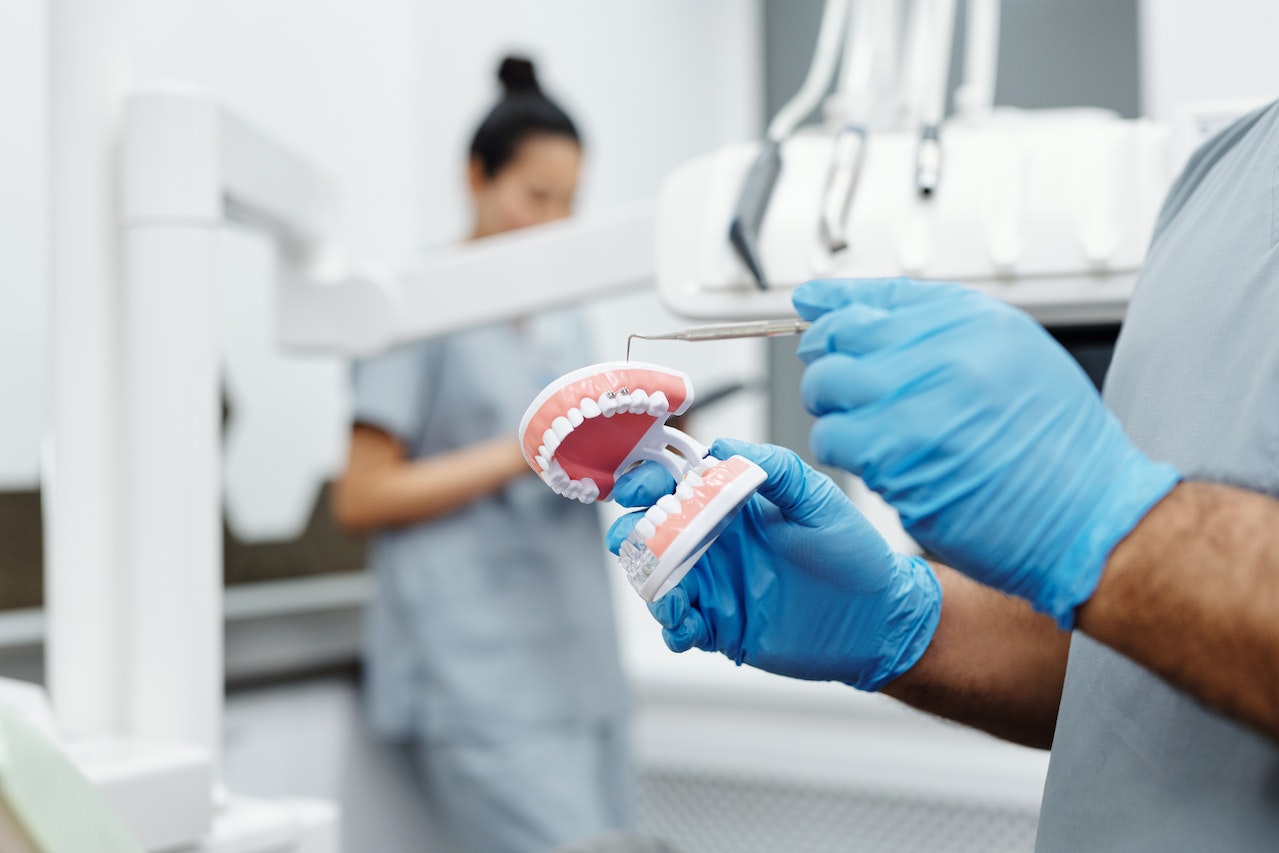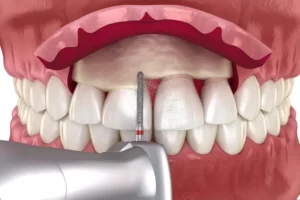
26 Apr A Step-by-Step Guide to Treatment Planning
The journey towards your new smile begins with a thorough pre-implant evaluation. This process involves evaluating all the factors that could impact the implant procedure, how the dentist will approach it, and how the dentist plans to manage or minimise any complications based on the patient’s history. This involves reviewing the patient’s dental history, taking precise X-rays and even a CT scan to evaluate the condition of the remaining teeth and jawbone, and considering the patient’s aesthetic preferences to create a customised treatment plan. This comprehensive approach ensures that patients receive the best possible care and achieve natural-looking, functional replacement teeth.
Yet, this roadmap to a more confident smile might include some unexpected turns, such as the necessity of a bone graft—something crucial in ensuring the success of these implants. The unseen world of dental implant preparation makes all the difference.
Pre-Implant Evaluation
A thorough assessment is crucial before envisioning your new smile with dental implants. Your journey starts with an in-depth evaluation of your oral health and general well-being. This involves carefully reviewing your dental history to identify existing conditions that could impact the implant procedure and its outcomes.
Furthermore, comprehensive X-rays and, if necessary, a CT scan are taken to evaluate the quantity and quality of the bone in your jaw. This step helps the dental team better understand your bone structure and envision how the implants will integrate. It’s like creating a map for the precise placement of the implants, ensuring a secure and stable foundation for the prosthetic teeth. It’s important to remember that each person is unique, and this imaging process allows for a personalised approach tailored to your specific needs. For instance, in some cases, dental impressions might be taken to create a physical model of your mouth structure. This tangible model aids in accurately visualising and planning the upcoming dental restoration procedure.
This meticulous evaluation isn’t just about ensuring you’re ready for the treatment—it’s about establishing a strong base for a successful outcome. By identifying potential challenges at this stage, your dental team can meticulously plan the course of action, customising every aspect of your treatment to ensure its effectiveness and longevity.
Assessing Bone and Jaw Capabilities
The success of dental implants heavily relies on the existing bone density and volume in the jaw. Specialised imaging techniques like Computerised tomography (CT) or cone beam computed tomography (CBCT) are often used to evaluate this. These images provide a detailed 3D view of the jawbone, allowing the dental team to accurately assess bone mass and quality.
Bone Density and Volume Assessment:
Understanding bone density helps determine whether it can effectively support dental implants. The average bone density required for successful implants falls between 350 and 850 Hounsfield units. Using CBCT scans, these specific measurements can be calculated, ensuring that the jawbone meets the criteria for implant success.
Moreover, the volume of available bone is equally critical for the stability of implants. The minimum bone height required is around 10mm, while the minimum width should be approximately 5mm. By thoroughly assessing density and volume, your dentist can ascertain if the jawbone provides a suitable foundation for successful implantation.
Additional Procedures and Bone Grafting:
In cases where the bone density or volume falls short of the ideal requirements, additional procedures such as bone grafting might be necessary
 to enhance the bone quality and quantity. This involves adding bone tissue to deficient areas, which aids in creating a stable foundation for the implants.
to enhance the bone quality and quantity. This involves adding bone tissue to deficient areas, which aids in creating a stable foundation for the implants.
For instance, a patient with severe tooth loss and bone atrophy may require augmentative procedures to prepare their jaw for implant placement. Typically, these processes involve multiple surgeries and prolonged treatment times. However, with careful assessment using CBCT scans and other diagnostic tools, the need for such extensive procedures can be identified early on, allowing for a more streamlined and efficient treatment approach.
Risk Management and Success Prediction:
By evaluating bone density and volume before implant surgery, clinicians can anticipate any potential complications during or after the procedure. This proactive approach reduces unforeseen risks and enhances overall treatment predictability. It’s like assessing a site to build a strong structure—without a stable foundation, even the best design won’t hold up over time.
A thorough assessment of bone and jaw capabilities ensures a suitable foundation for implants and plays a pivotal role in managing potential risks and predicting treatment success. This meticulous evaluation sets the stage for a well-planned and effective implant procedure, laying the groundwork for long-term patient satisfaction.
Preparing for the Procedure
Before any major procedure, being well-prepared mentally, emotionally, and physically is crucial. The same goes for the dental implant treatment. Here’s what you should consider as you prepare for this transformative procedure.
Pre-Operative Instructions
Patients undergoing the procedure receive specific pre-operative instructions from their dental team. This may involve guidelines on pre-procedure dietary restrictions, which means avoiding food and drink for a specified period before the surgery. Typically, fasting might be required from midnight the night before the procedure. Following these instructions is vital to ensure a smooth and successful surgical experience.
Transportation Arrangements
Another important aspect of preparation for the procedure is arranging transportation to and from the dental clinic. Since patients will be under the influence of sedation during the procedure, it’s unsafe for them to drive themselves home afterwards. Therefore, having a friend or family member present to provide transportation and support after the surgery is crucial.
Pre-Procedure Medical Tests and Evaluations
In some cases, pre-procedure medical tests and evaluations are necessary to assess the patient’s overall health before undergoing the treatment. This may include blood tests, imaging studies, or consultations with other medical specialists to ensure that the patient is fit for the procedure and determine if any potential risks must be addressed beforehand.
Implant Consultation with the Dental Team
Patients can expect thorough consultations with their dental team before the treatment. These discussions allow patients to address any questions or concerns about the procedure, understand what to expect during recovery, and learn about post-operative care instructions. “It’s important to remember that preparation for the procedure is not just a formality but a crucial step in ensuring a successful treatment outcome. Following pre-operative instructions and making necessary arrangements will help facilitate a smoother and more comfortable experience throughout the process.”
Importance of Candidate Selection
Choosing the right candidate for the dental implant procedure is crucial for the overall success and longevity of the treatment. It goes beyond a person’s physical appearance and involves a comprehensive evaluation of their overall health, bone quality, and willingness to commit to diligent oral hygiene practices. These factors play a significant role in determining the candidate’s suitability for the procedure and their potential for successful treatment outcomes.
When evaluating a candidate’s overall health, it’s essential to consider existing medical conditions that could impact their ability to heal after surgery. Conditions such as uncontrolled diabetes or autoimmune disorders may increase the risk of complications during and after the implant procedure. Additionally, a candidate’s bone quality plays a critical role in ensuring the longevity and stability of the implants. Adequate bone density is necessary to support the implants and promote successful osseointegration—the process where the implants fuse with the jawbone. Furthermore, maintaining oral hygiene is paramount for the long-term success of dental implants. Candidates should thoroughly understand post-operative care requirements and be willing to adhere to strict oral hygiene practices. This includes regular brushing, flossing, and routine dental check-ups to prevent infections and ensure the implants remain healthy and functional over time.
For instance, consider a candidate deeply committed to maintaining good oral health by following a consistent dental hygiene routine. This individual is likely to have better chances of maintaining the health and functionality of their implants compared to someone who may not prioritise oral care. In addition to these factors, candidates should have a clear understanding of the All-On-4 implant procedure and its potential outcomes. They should be well-informed about the surgical process, recovery period, and realistic expectations regarding the final results. Education and open communication are key to ensuring that candidates are mentally prepared for the challenges and rewards of this transformative treatment.
Choosing candidates based on these considerations significantly contributes to achieving positive treatment outcomes and long-term oral health benefits with dental implants.
In summary, the treatment planning for dental implants involves a comprehensive assessment of the patient’s oral health, including functional, radiological, psychological, and aesthetic evaluations. By taking into account each patient’s unique needs and characteristics, dentists can create a customised treatment plan that allows the dental team to determine if the patient qualifies for the treatment concept and ensure successful outcomes and long-term oral health.


